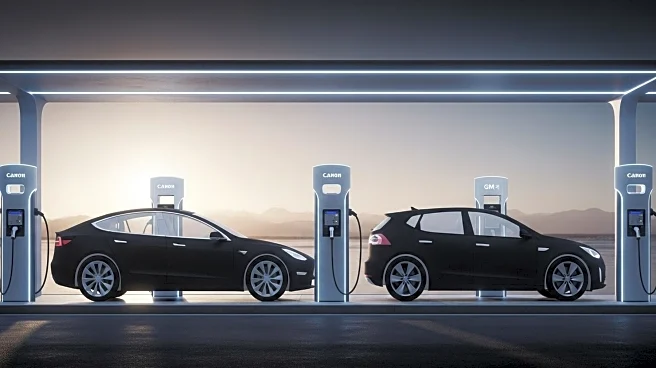What is the story about?
What's Happening?
Tesla and General Motors are at the forefront of the U.S. automotive industry's record-breaking sales of all-electric vehicles this year. According to data from Motor Intelligence, U.S. sales of electric vehicles, excluding hybrids, surpassed 1 million units in the first nine months of the year. This surge in sales coincided with the expiration of federal incentives, which offered up to $7,500 per purchase, in September. The third quarter alone saw a new record of over 438,000 units sold, achieving a market share of 10.5%. Tesla maintained its leadership position with a 43.1% market share, although this is a decrease from 49% at the end of the previous year. General Motors, which offers the most EV models in the U.S., increased its market share from 8.7% at the beginning of the year to 13.8% by the third quarter, surpassing Hyundai Motor, including Kia, which held an 8.6% share.
Why It's Important?
The surge in electric vehicle sales marks a significant shift in the U.S. automotive market, driven by consumer demand and the strategic positioning of major automakers like Tesla and GM. The end of federal incentives has accelerated purchases, indicating strong consumer interest in EVs despite the removal of financial benefits. This trend underscores the growing importance of electric vehicles in the U.S. market, with Tesla and GM leading the charge. GM's substantial market share growth highlights its competitive edge, attributed to its diverse lineup of EV models and strategic pricing. The shift towards electric vehicles is likely to influence future automotive industry policies, investment in EV infrastructure, and the development of new technologies.
What's Next?
As federal incentives have ended, automakers may need to adjust their strategies to maintain sales momentum. This could involve enhancing vehicle features, expanding charging infrastructure, or offering competitive pricing. The continued growth of the EV market may prompt further investment in battery technology and sustainable energy solutions. Additionally, other automakers like Ford, Volkswagen, and Honda, which have smaller market shares, may intensify efforts to capture a larger portion of the EV market. The evolving landscape may also lead to increased regulatory scrutiny and policy adjustments to support the transition to electric vehicles.
Beyond the Headlines
The shift towards electric vehicles has broader implications for environmental sustainability and energy consumption. As more consumers opt for EVs, there may be a reduction in carbon emissions and reliance on fossil fuels. This transition could also impact the job market, with potential growth in sectors related to EV manufacturing, battery production, and renewable energy. Furthermore, the increased adoption of electric vehicles may drive innovation in related technologies, such as autonomous driving and smart grid systems.















